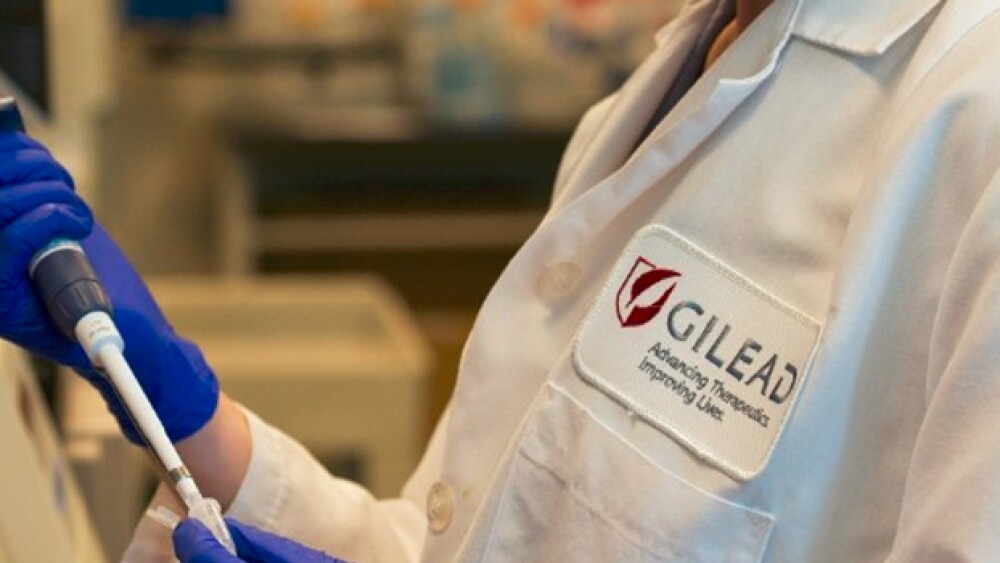Gilead Sciences is acquiring the global rights to develop and commercialize novel small molecules against two targets from Yuhan Corporation, based in South Korea. They drugs will be developed to treat advanced fibrosis related to nonalcoholic steatohepatitis (NASH).
Gilead Sciences is acquiring the global rights to develop and commercialize novel small molecules against two targets from Yuhan Corporation, based in South Korea. The drugs will be developed to treat advanced fibrosis related to nonalcoholic steatohepatitis (NASH). NASH is a form of liver disease that can lead to cirrhosis but is not caused by alcohol consumption.
The two companies will conduct preclinical research together, but Gilead will be responsible for global clinical development. Gilead will also handle commercialization worldwide, outside of the Republic of Korea.
Gilead is paying Yuhan $15 million up front. Yuhan is eligible for up to another $770 million in possible milestone “biobucks” payments as well as royalties.
The two companies already have a commercial collaboration to promote Gilead’s products in the Republic of Korea.
“This collaboration builds on our long-term partnership with Yuhan, with a new focus on the investigation of novel approaches to treat patients with advanced fibrosis due to NASH that complement our ongoing research programs,” stated John McHutchison, Gilead’s chief scientific officer and head of Research and Development. “We look forward to working with the Yuhan team to advance our work in this area where there is a significant unmet need for patients.”
In December 2018, Gilead inked a strategic collaboration with Cambridge, Mass.-based Scholar Rock to discover and develop highly specific inhibitors of transforming growth factor beta activation for fibrotic diseases, including NASH. TGFßf-driven signaling is believed to be a major regulator of fibrosis.
Gilead paid Scholar Rock $80 million up front, made up of $50 million in cash and the acquisition of $30 million in common stock. Also, Scholar Rock will receive a one-time milestone payment of $25 million when it successfully completes specific preclinical studies. It may also be eligible to receive up to $1.425 billion in potential payments across all three programs based on various research, development, regulatory and commercialization milestones. Scholar Rock is also eligible for high single-digit to low-double-digit tiered royalties on future product sales.
Nagesh Mahanthappa, president and chief executive officer of Scholar Rock, said at the time, “Gilead’s commitment to developing innovative therapies for fibrotic diseases makes the company an ideal partner to maximize the value of candidates form our TGFß program. This collaboration also emphasizes our belief in the tremendous potential of Scholar Rock’s broad pipeline of highly specific modulators targeting the TGFß superfamily, with potential applications in a wide range of serious diseases, including neuromuscular disorders, cancer, fibrosis and anemia.”
This focus on NASH by Gilead makes sense. The company remains the dominant player in the hepatitis C market (HCV), but their success has also been their downfall. Their HCV drugs are so successful, they have essentially cured the disease, creating a smaller and smaller patient pool to draw on.
The company otherwise has a strong HIV and hepatitis B (HBV) portfolio and has made some forays into immuno-oncology. For example, also in December 2018, Gilead signed a collaboration deal with Lexington, Mass.-based Agenus to develop and commercialize up to five therapies in immuno-oncology. Gilead paid Agenus $150 million on closing, $120 million in cash and $30 million in equity, with about $1.7 billion in potential fees and milestone payments.
But liver disease is definitely their strength and the company’s expertise there should help it develop and commercialize products for the NASH market. As of December, Gilead had three clinical-stage programs for NASH, including selonsertib in Phase III trials.
Because NASH is considered a multifactorial disease—fibrosis, inflammation, metabolism—most experts believe combination therapies will be the way to go. And before today’s deal, Gilead had inhibitors that target activation of latent TGFß1, drugs that target activation of latent TGFß1 localized to the extracellular matrix, and a third TGFß program. Gilead lists six drugs for liver diseases, including hepatitis B, and at least three are for NASH.





